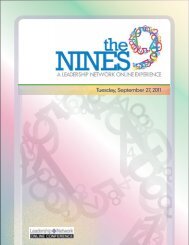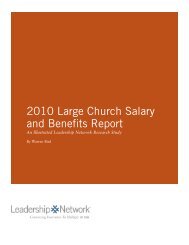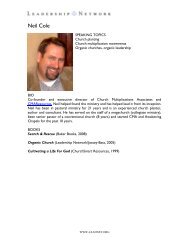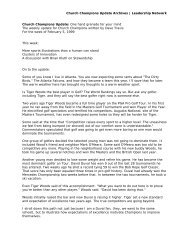ARE WE A PEOPLE AT HALF TIME? - Leadership Network
ARE WE A PEOPLE AT HALF TIME? - Leadership Network
ARE WE A PEOPLE AT HALF TIME? - Leadership Network
You also want an ePaper? Increase the reach of your titles
YUMPU automatically turns print PDFs into web optimized ePapers that Google loves.
Vulnerability does not mean transparency. Transparency is<br />
simply disclosing yourself to others at times and in ways that<br />
you choose. In vulnerability, you deliberately place yourself<br />
under others' influence, submitting yourself to others' strengths.<br />
You give others the right to know the pain of your weaknesses<br />
and to care for you. You choose to let others know you, to have<br />
access to your life, to teach you and to influence you.<br />
Notice that vulnerability triggers two relational effects. First,<br />
people gain access to your life as you submit to their influence.<br />
Second, you are given access to their lives as they trust you<br />
and see that your life is open to them. What do we call this<br />
kind of relationship Authenticity.<br />
The character ladder is not as concerned with what we do as<br />
it is with who we are. Its emphasis is on human “being" more<br />
than human “doing." When we ascend the first and second<br />
rungs of the character ladder, entrusting our needs to God and<br />
others and choosing to open our lives for their review, we soon<br />
face the next step — the third rung on the character ladder<br />
— align with truth. On this rung, we must ask more soul-searching<br />
questions: Will I listen to what they say Do I believe it is<br />
true Will I follow their advice This is the true test of character;<br />
not just coming under others' influence but acting on the<br />
wisdom and truth of their counsel.<br />
On the fourth rung of the capacity ladder, we may enjoy certain<br />
privileges, power and authority from our climb. On the fourth<br />
rung of the character ladder, we come face to face with daily<br />
opportunities to set aside those same short-ladder payoffs in<br />
order to make profound differences in the lives of others. The<br />
tension comes in deciding which to choose, especially when<br />
some character-ladder choices require capacity-ladder setbacks.<br />
On the character ladder, we must pay a price. Within the<br />
boundaries of loving God and loving others, the payment will<br />
be different for each of us.<br />
Leaders desire to lead from the fifth rung — to discover destiny.<br />
Getting there depends on the process of developing character<br />
in the context of the right relationships and environments.<br />
Getting to, and staying on, the fifth rung has nothing to do<br />
with pursuing power. It is about learning how to receive power.<br />
The fifth rung is no panacea. It does not cure all our ills or pave<br />
the way to a utopian life. It is rooted in reality. It is dependent<br />
upon the first four rungs and the rails of the character ladder.<br />
But in the climb we find peace. We find joy. We find fulfillment.<br />
We find God, and we find a community that helps us know<br />
our Creator and ourselves more fully.<br />
Excerpts of The Ascent of a Leader were used with permission of the publisher,<br />
Jossey-Bass. The book was published in October, 1999.<br />
To order, call 602-249-7000 or your local bookstore.<br />
Bill Thrall, Bruce McNicol and Ken McElrath are chairman, president<br />
and director of marketing, respectively, of <strong>Leadership</strong> Catalyst,<br />
a training and consulting firm that focuses on leadership development.<br />
Visit their website at www.leadershipcatalyst.org.<br />
www.leadnet.org<br />
6<br />
with<br />
Bruce McNicol<br />
co-author of<br />
The Ascent of a Leader<br />
NEXT: How did you select the metaphor of the ladder<br />
McNicol: The ladder came from watching many leaders<br />
malfunction at the apex of their influence. We realized that<br />
as they climbed the capacity ladder where their competencies<br />
had been very expensively and extensively trained, their<br />
character had been merely presumed. People presumed that if<br />
they had certain levels of responsibility, their character could<br />
be trusted. Many of the leaders themselves did not realize that<br />
they could not be trusted. They were sincerely committed to<br />
God, but simply did not have the spiritual character to deal<br />
with the weight of their influence once they reached the apex<br />
of their leadership.<br />
NEXT: What do you mean by “capacity-ladder leaders focus<br />
on the appearance of performance”<br />
McNicol: The capacity-ladder leader often assumes a<br />
performance environment in which imperfection and failure<br />
are not typically honored. We position ourselves in such a way<br />
that those who are our colleagues or followers believe we are<br />
actually able to perform even when we are not. This causes<br />
the capacity-ladder leader to have the appearance of success<br />
when, in reality, we are not succeeding at all.<br />
NEXT: What is the message for pastors or other church leaders<br />
who might find themselves becoming more and more<br />
“performance” driven<br />
McNicol: We want them to have an enduring legacy, to reach<br />
God's destiny, not just their own goals. The best way to ensure<br />
that is to develop their character. This is where they will get<br />
tripped up, not in their competencies but in their character<br />
and their relationships.<br />
NEXT: If a pastor should turn out to be at the top of the capacity<br />
ladder and yet is looked to by others as the leader in terms of<br />
creating an environment of grace and relationships and they<br />
can't do it, what happens<br />
McNicol: The first issue in God ultimately exalting us is<br />
humility. If a pastor recognizes this principle and knows that<br />
they do not have the infrastructure that we talked about, they<br />
need to be protected. Their humility will kick in at this point<br />
and they will start to ask how to develop the infrastructure,<br />
beginning with their closest colleagues and perhaps the elder<br />
board or pastoral team. Here the definition of humility is very<br />
important — trusting God and others with me. These kinds<br />
of leaders are good at trusting God with other people but not<br />
always so good at trusting God with themselves.<br />
NEXT: Say something about the “myth of self-sufficiency" you<br />
describe in the book.<br />
McNicol: It is very common in a performance culture. Many<br />
followers want to believe that their leaders are self-sufficient<br />
and many leaders will take on that public identity. But if we<br />
read Scripture well, we know it is not true. The issue is, how<br />
can I train out, or unlearn, that myth and learn instead the<br />
truth that grace actually thrives on imperfection Performance<br />
thrives on perfection while grace thrives on imperfection. If<br />
I don't remember that, then I won't get to first base.<br />
interviewed by Carol Childress







